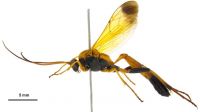ICHNEUMONIDAE: : Ophion Fabricius 1798
Diagnosis:
Characteristics of Ophion include: 1. Most species the body size <10mm, but Ophion peregrinus is 10-20mm; 2. Position of spiracle on T1 of metasoma clearly behind the centre; 3. No aerolet in forewing; 4. Colour of face is not all black; 5. Metasoma very compressed laterally; 6. Size of ocelli large or small; 7. Length of antennae variable, shorter, as long, or longer than body; 8. Length of ovipositor is barely visible; 9. Wings present; 10. Colour of wings are hyaline (clear); 11. Sternaulus absent; 12. Shape of face in lateral view is flat or only weakly bulging; 13. Sternite on T1 (viewed laterally) extends past spiracle sometimes forming a long cylinder with tergite; 14. Shape of T1 (viewed laterally) is evenly curved; 15. Number of teeth in mandibles 2; 16. Patterns on metasoma is the same colour throughout; 17. Length of T1 longer than T2; 18. Sculpture on mesoscutum is smooth, very polished or finely pitted, many hairs; 19. Width of T1 (viewed dorsally) is anteriorally slender often parallel, strongly widening behind spiracle OR width of T1 uniform width; 20. Glymma on T1 absent; 21. Sculpture on metasoma is smooth with a semi-glossy or satin appearance at least on T2; 22. Propodeum reaching past coxal insertion, but not reaching halfway along metacoxae.Similarity to Other Taxa
Ophion peregrinus is a large-sized Ichneumonid in New Zealand. It is similar in size to: Rhyssa , Lissopimpla , Echthromorpha , Enicospilus , Eutanyacra , Xanthocryptus , Ichneumon , Netelia , Ctenochares , and Degithina .The largest species in New Zealand, Ophion peregrinus , is most similar to i) Enicospilus , which have sclerotized inclusions in the forewing; and ii) Netelia (Tryphoninae), which have a closed areolet and have the spiracle on tergite 1 at or before the middle of the segment (it is towards the end of the segment in Ophion ). Despite having a colourful mesosoma, O. peregrinus is distinct from other large colourful ichneumonids by having a brown metasoma without colourful spots or bands (e.g. Eutanyacra and Ichneumon ).
Compare
-

Ctenochares
Has distinct colourations in the forewing, Ophion peregrinus has clear wings. -

Lissopimpla
Has distinct colourations in the forewing, Ophion peregrinus has clear wings. -

Echthromorpha
Has distinct colourations in the forewing, Ophion peregrinus has clear wings. -

Degithina
Has T1 humped (bulge), but Ophion peregrinus is evenly curved/flat. -

Rhyssa
Has spots on the metasoma not stripes, and the ovipositor in Rhyssa is as long(er) than the body.
Distribution in NZ
North Island: ND, AK, BP, CL, GB, HB, TK, TO, WI, WN. South Island: NN, NC, BR, MC, DN, CO, OL, WD, FD, SI, MK, SL. Offshore Islands: CH, AU.
Species in NZ
Four endemic species: Ophion inutilis Smith 1876; O. oculatus Parrott 1954; O. peregrinus Smith 1876; O. punctatus Cameron 1898. Parrott (1954) also listed a number of subspecies, however there is uncertainty about whether these are valid (Valentine & Walker 1991). Parrott’s key (1954) is difficult to use, and this genus is in need of revision.Biology & hosts
Ophion is mainly a North Hemisphere Holarctic genus with relatively few species in the Australasian region (Gauld 1984a). New Zealand species may be more related to those in Papua New Guinea, than from Australia (Gauld 1984b). Very little is known about their biology in New Zealand, and no hosts are known, although because they are nocturnally active, the hosts are assumed to be nocturnal. Ophion are widespread across New Zealand, including the Chatham and Auckland Islands (Johns 1964) and are also found in many different habitats, including alpine tussock, bush, coastal forest, swamps and urbanised areas.Sources of information
Gauld ID. 1977. A revision of the Ophioninae (Hymenoptera: Ichneumonidae) of Australia. Australian Journal of Zoology, Supplementary Series 49: 1-112.Gauld ID. 1984a. An Introduction to the Ichneumonidae of Australia. London, British Museum (Natural History). 413 p.
Gauld ID. 1984b. The Australian Ophioninae (Insecta: Hymenoptera): a historical biogeographic study. Journal of Biogeography 11: 269-288.
Johns PM. 1964. The occurrence of Australophion peregrinus (Smith) (Hymenoptera) on Auckland Islands. New Zealand Entomologist 3:38.
Parrott AW. 1954. New Zealand Ichneumonidae. III. Sub-family Ophioninae. Tribe Ophionini. Transactions of the Royal Society of New Zealand 8: 627-645.
Valentine EW & Walker AK. 1991. Annotated Catalogue of New Zealand Hymenoptera. DSIR Plant Protection Report 4. General Printing Services, 84 pp.
Citation
Ward DF & Schnitzler FR. 2013. Ichneumonidae of New Zealand. Genus Ophion http://ichneumonidae.landcareresearch.co.nzAccessed: 27 April 2025



